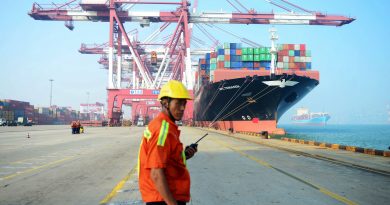Lapland grocers turn to Filipino workforce as population ages

Lapland municipalities are getting older, and essential workers are in shorter supply.
Jove Fernandez works at Pello S-Market, in Lapland. She moved from the Philippines, and says she’s pretty happy with the decision.
“Finland is the country of my dreams and I want to continue my career here,” says Fernandez, who studied business in her home country.
She is thankful to her colleagues for their friendliness and helpful nature, as they help her settle in. In her free time she likes to enjoy Lapland’s abundant nature.
“Finland is one of the happiest countries in the world,” says Fernandez. “I like to enjoy all of this by being in nature and grilling sausages with my friends.”
Jaana Järvenpää, manager of the Pello store, is satisfied with her Filipino staff’s output and willingness to learn.

“They are always asking how things are done and then they do them,” said Järvenpää. “They are hard-working, happy and smiling. Customers like them and from my point of view too they are perfect staff.”
Feedback has been positive
Jove Fernandez and 13 other Filipino employees arrived in Lapland as a result of a deal between employment agency Barona and the local Cooperative retailer, Arina.
Arina’s HR manager Minna Salonen says the cooperation has started out really well.
The new workers have a lot to learn, but feedback from colleagues and customers alike has been positive. Salonen said that the only slight problem was explaining Finnish labour laws.
“The only slightly negative problem is that the Filipino workers cannot do as much work as they would like,” said Salonen. For them, the weekly maximum hour limit is very strange.”
Retailers don’t have the staff
Salonen says that Arina would prefer to employ people already living in Finland, in the first instance, but there is little enthusiasm for retail jobs in some places.
In addition, Lapland municipalities’ older populations suggest that the labour shortage in the sector will continue as younger people move in search of work and study possibilities.
“Automation and digitisation make it possible that in the future they could remove some of the need for labour, but we will of course always need people,” said Salonen.
Pello and Kolari S-Markets’ manager Jaana Järvenpää has experienced the difficulties of hiring staff at first hand.
“I’ve been in Pello for three years and in that time I haven’t had a single open application,” said Järvenpää. “They haven’t come even if we’ve advertised.”
In Kolari the situation is a little different.
“There are a lot of young people there, so it is easy to find labour,” says Järvenpää. “But when they leave to study, then there is a hole to fill. Young people are not committed to jobs in the same way as slightly older people.”
Attitudes are changing, however, according to Järvenpää.
“The regard [for working in retail] has risen, because it is varied work,” says Järvenpää. “There’s the checkout, there’s unloading and ordering. That demands more from the applicant as well. They need to be positive, open, work quickly and willing to learn new things.”
Why the Philippines?
The Filipino workers in Lapland were brought there by Barona. They go through an application process run by Barona’s local partner, which has met certain ethical standards.
Barona’s task is to ensure that workers’ integration is as seamless as possible.
“This project began a year ago,” said Barona’s international labour head Elina Koskela. “Those who got the jobs went through a five month language course and got their hygiene certificates, among other things. In the language classes they went through a lot of the terminology used in the sector.”
Permanent employees
Barona says that it has experience of bringing workers from the Philippines and the experiences have been mostly good: more than 90 percent of the people it brings over stay in Finland.
Tens of thousands of people leave the Asian country to work abroad each year, and there were hundreds of applicants to come to Finland.
The Filipino workers are employed by Barona for the first year of their stay in Finland. They get integration assistance from the firm, including with wages and taxation issues.
Barona and Arina also arrange accommodation, with the employees paying the rent themselves.
Related stories from around the North:
Canada: It’s ‘weird busy’ this summer, says Yukon shop owner. Tourists came back but the workers didn’t, CBC News
Russia: Critical workforce shortage grips Russia’s North, The Independent Barents Observer
Sweden: Sweden, Norway and Finland cooperating to attract workers to the far north, Radio Sweden



